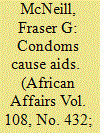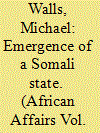|
|
|
Sort Order |
|
|
|
Items / Page
|
|
|
|
|
|
|
| Srl | Item |
| 1 |
ID:
098507


|
|
|
|
|
| Publication |
2009.
|
| Summary/Abstract |
The article examines the Tripartite Alliance in South Africa, drawing on in-depth interviews with members of the National Union of Mineworkers employed by Eskom, South Africa's electricity parastatal. The article challenges the widespread argument that the alliance is heading for an inevitable break-up by interrogating the resilience of workers' support for the ANC. It is argued that workers continue to identify a broad range of aspirations with the party and that the ANC thus remains the primary figurehead of political and social change in these workers' political imaginations. Exploring the attitudes of Eskom workers towards the ANC's presidential succession battle, it is shown that workers continue to hold the ANC as an organization to be sacrosanct: the failures of the ANC government were considered to result from the failure of individual leaders to meet their expectations of representation, mediation, and accountability within the post-apartheid democratic era, rather than any irredeemable ideological shortcoming of the ANC itself.
|
|
|
|
|
|
|
|
|
|
|
|
|
|
|
|
| 2 |
ID:
098505


|
|
|
|
|
| Publication |
2010.
|
| Summary/Abstract |
This article presents a critique of the position that South Africans are engaged in a process of collective HIV/AIDS denial. Ex-President Mbeki's well-documented belief that HIV does not lead to AIDS, and that South Africans are not dying of AIDS-related disease, has been used by academics and journalists to explain the widespread public silence around the pandemic. The article argues that the complex social processes employed to create and maintain the avoidance of open conversation around HIV/AIDS are rooted, not in Mbeki's denialism, but rather in conventions through which causes of death can, and cannot, be spoken about. Through case studies of poisonings and public performances by HIV/AIDS educators, the article demonstrates that by invoking public silence and coded language, 'degrees of separation' are constructed that create social distance between individuals and the unnatural cause of another's death. Far from a collective denial, acts of public silence and obfuscation should be read as protestations of innocence: attempts to drive a wedge between open, public knowledge of death and potential implication in the increasing number of AIDS-related fatalities. HIV/AIDS prevention policies based on inadequate understandings of this wider context have given rise to the social construction of peer educators - and condoms as their central symbol of prevention - as vectors of the virus.
|
|
|
|
|
|
|
|
|
|
|
|
|
|
|
|
| 3 |
ID:
098506


|
|
|
|
|
| Publication |
2010.
|
| Summary/Abstract |
At a time when Somalia is widely viewed as a political and humanitarian disaster, it is significant that the north-western territory of Somaliland has installed a comparatively stable government and held a series of elections that have been declared 'relatively free and fair' by observers. This article considers a key period in the establishment of the current system of state, from the 1991 collapse of the Siyaad Barre regime to the 1993 conference in the northern town of Borama which saw the transition from an interim military government to civilian administration. While the Borama conference did not end conflict in Somaliland, it resulted in an interim constitution that eventually enabled a more lasting peace, along with popular elections for local government, President, and Lower House of Parliament. The article argues that the success of the 1991-3 process was built on a set of deeply embedded social norms that emphasized the importance of dialogue between antagonists; a willingness to accept that the most complex grievances would be set aside indefinitely to avoid the contentious process of negotiating compensation payments; the opening of space for the intervention of mediators; and a sustained commitment to consensus building in preference to divisive voting. In short, local resources have been employed effectively in the cause of achieving a lasting peace and what appears to be a viable system of democracy.
|
|
|
|
|
|
|
|
|
|
|
|
|
|
|
|
| 4 |
ID:
098508


|
|
|
|
|
| Publication |
2010.
|
| Summary/Abstract |
Africanists have long criticized the social construction, and consequences, of technical knowledge. Colonial science was seen as a particularly problematic enterprise, moulded by authoritarian colonial states, wherein science 'delineated the relationship of power and authority between rulers and ruled'. Much the same critique has been applied to post-colonial experts and expertise, becoming almost paradigmatic in the literature. This article seeks to re-open this debate, pointing to the diverse and changing location of scientists; the salience of scientific work in constructing categories and understandings for historians and social scientists; the value of trying to understand scientific explanations, as opposed simply to analyse their application in coercive policies; and the degree to which experts have sometimes incorporated local knowledge. The article draws examples from veterinary science and policy in southern Africa, and seeks to move beyond the inversions of colonial thinking in post-colonial analysis and provide instead a platform for interdisciplinary research strategies.
|
|
|
|
|
|
|
|
|
|
|
|
|
|
|
|
| 5 |
ID:
098509


|
|
|
| 6 |
ID:
098510


|
|
|
|
|
| Publication |
2010.
|
| Summary/Abstract |
Peace accords usually involve top politicians and military leaders, who negotiate, sign, and/or benefit from an agreement. What is conspicuously absent from such negotiations is broad-based participation by those who should benefit in the first place: citizens. More specifically, the local level of security provision and insecurity production is rarely taken into account. The analysis of recent African peace agreements shows important variations in power-sharing devices and why it is important to ask who is sharing power with whom. Experiences with power sharing are mixed and far less positive than assumed by outside negotiators.
|
|
|
|
|
|
|
|
|
|
|
|
|
|
|
|
|
|
|
|
|